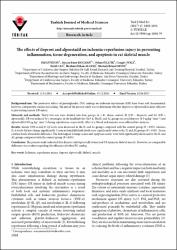The effects of iloprost and alprostadil on ischemia-reperfusion injury in preventing inflammation, tissue degeneration, and apoptosis in rat skeletal muscle

Göster/
Erişim
info:eu-repo/semantics/openAccessTarih
2017Yazar
Guneysu, ElifKocman, Atacan Emre
Ozatik, Orhan
Ovali, Cengiz
Can, Betul
Alatas, Ibrahim Ozkan
Sevin, Mustafa Behcet
Üst veri
Tüm öğe kaydını gösterÖzet
Background/aim: The protective effects of prostaglandin (PG) analogs on ischemia-reperfusion (I/R) have been well documented; however, comparative studies are lacking. The aim of the present study was to determine whether iloprost or alprostadil is more effective in preventing muscle I/R injury. Materials and methods: Thirty-two rats were divided into four groups (n = 8): sham, control, IL (I/R + iloprost), and AL (I/R + alprostadil). I/R was induced by a tourniquet in the hindlimb for 3 h/3 h. The IL and AL groups received iloprost (0.5 ng kg(-1) min(-1)) and alprostadil (0.05 mu g kg(-1) min(-1)) during reperfusion, respectively. After 6 h, blood and muscles were collected for analyses. Results: Serum TNF-alpha and IL-1 beta levels were decreased in the IL and AL groups compared with the control group (P < 0.05), whereas IL-6 levels did not change significantly. Tissue malondialdehyde levels were significantly lower in the IL and AL groups (P < 0.05). Tissue catalase levels showed no difference. The histological damage scores and apoptosis scores were both significantly decreased in the IL and AL groups compared with the control group (P < 0.05). Conclusion: The present study indicated that iloprost and alprostadil attenuated I/R injury in skeletal muscle. However, no comparable difference was evident regarding the efficacies of either PG analog.

















